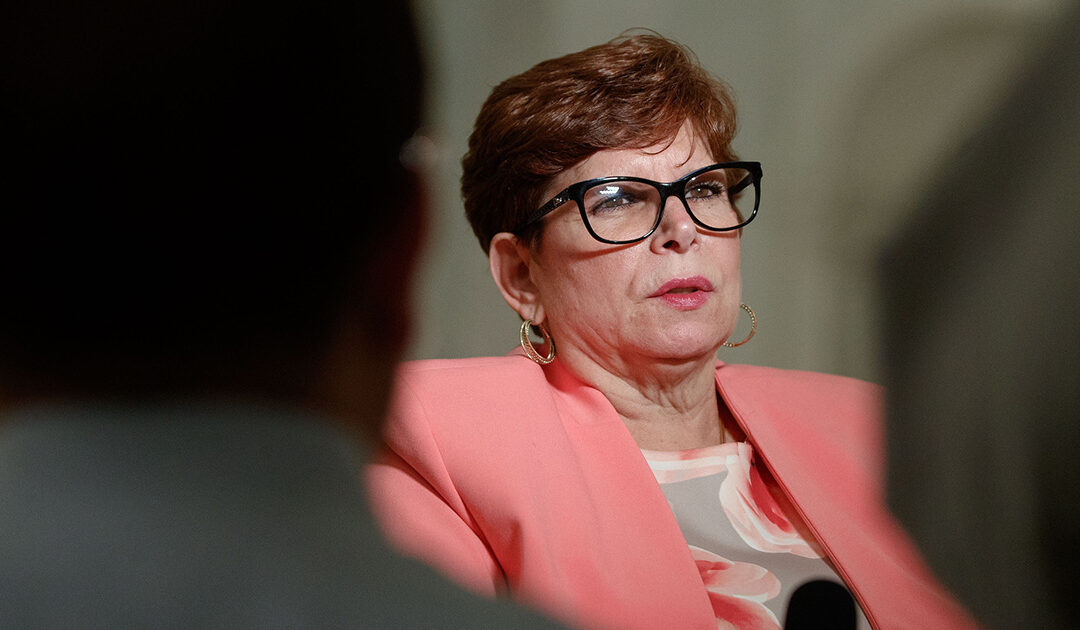
by Christin Brown | Octubre 9, 2024 | News Releases
HARRISBURG, PA - 9 de octubre de 2024 - Hoy en día, cuatro miembros de la bancada demócrata del Senado presentó una demanda en el Tribunal de la Commonwealth contra el Presidente Pro Tempore Kim Ward, el senador Joe Pittman, y el senador Jarret Coleman con el fin de detener una citación obligando al Secretario de Ingresos Pat Browne de entregar datos sensibles de los contribuyentes. Ayer, la Resolución del Senado 334 fue aprobada 28-22 ordenando al Sargento de Armas para llevar a Pat Browne ante el Senado.
Los senadores Jay Costa, Vincent Hughes, Tina Tartaglione y Nikil Saval unieron sus fuerzas para presentar una demanda ante el Tribunal de la Commonwealth para impugnar la citación emitida por el Comité de Operaciones Intergubernamentales, señalando que se pidió a los senadores que votaran ilegalmente obligando al Secretario de Hacienda a violar los registros privados de un contribuyente; para pedir al Tribunal que impidiera la ejecución de la citación; y para pedir al tribunal que viera el asunto con celeridad.
<“We have been clear from the beginning that Senate Resolution 334 is inappropriate and should not be enforced,” said Senator Costa. “A resolution cannot and must not override the rule of law, specifically Act 24 of 2021. Secretary Browne is following the law as it is written. The lawsuits brought by my colleagues and me support Pat Browne in his following the rule of law.”
Aquí puede ver imágenes de las declaraciones del senador Costa durante el debate de la SR 334.
#####

por Christin Brown | 30 de noviembre de 2023 | reportaje, Comunicados de prensa
30 de noviembre de 2023 - Los miembros del Caucus Demócrata del Senado de Pensilvania, incluyendo el senador Vincent Hughes, el senador John Kane, la senadora Christine Tartaglione, y el senador Lindsey Williams, emitieron una declaración conjunta en respuesta a la opinión de la Corte Suprema de Pensilvania que apoya la jurisdicción de PennDOT para hacer cumplir la Ley de Salarios Compensatorios y su autoridad para descalificar a G.O. Hawbaker Inc. de los contratos de obras viales del estado.
Los cuatro senadores son patrocinadores del proyecto de ley 987 del Senado, legislación que obligaría a los empresarios a notificar a los trabajadores la práctica ilegal del robo de salario, al tiempo que ayudaría a proteger de represalias a los trabajadores que lo denuncien.
"Cuando nuestra Commonwealth hace negocios con organizaciones privadas, los ciudadanos de Pensilvania merecen saber que las empresas con las que contratamos son lo mejor de lo mejor y actúan con total transparencia. Aplaudimos al Tribunal Supremo de Pensilvania por responsabilizar a G. O. Hawbaker del robo de dinero a sus empleados. Y apoyamos los esfuerzos de PennDOT para descalificar a G. O. Hawbaker de futuros proyectos estatales.
El robo de salarios es una práctica moral y financieramente aborrecible. Cualquier empleador al que se descubra apropiándose indebidamente de la paga y las prestaciones de sus empleados debería ser obligado a indemnizarlos, como se hizo con G.O. Hawbreaker, y se le deberían imponer otras normas en el futuro. No debería permitirse a estas empresas reanudar su actividad con normalidad después de haber mostrado una intención tan maliciosa y una falta de respeto por el tiempo y el trabajo de los empleados.
Los trabajadores merecen el apoyo y las protecciones que han afirmado tanto el Tribunal Supremo de Pensilvania como PennDOT. En movimiento El proyecto de ley 987 del Senado y otras propuestas demócratas para combatir el robo de salarios (como el Proyecto de ley 46 del Senado, Proyecto de ley 47 del Senadoy Proyecto de ley 577 del Senado), sería otro tremendo paso adelante para los trabajadores de Pensilvania.
Esperamos que todas las empresas tomen nota de nuestro feroz compromiso con los trabajadores y con los salarios que justamente se les deben."
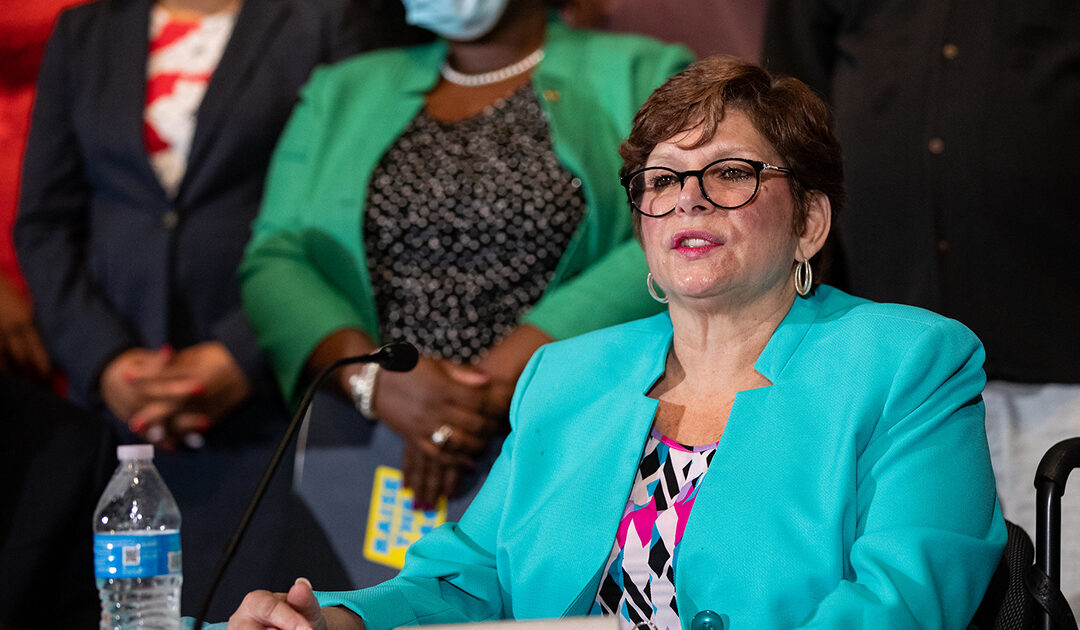
por Christin Brown | 7 de julio de 2023 | reportaje, Salario Mínimo, News Releases
Harrisburg, PA - 7 de julio de 2023 - El domingo 9 de julio se cumplen diecisiete años desde que los legisladores de Pensilvania aumentaron por última vez el salario mínimo.
 El 9 de juliothEn 2006, el gobernador Ed Rendell se unió a la senadora Christine Tartaglione, al senador Vincent Hughes y al senador Jay Costa para firmar la Ley del Senado 1090, la legislación de la senadora Tartaglione que elevaba el salario mínimo de Pensilvania a 7,15 dólares.
El 9 de juliothEn 2006, el gobernador Ed Rendell se unió a la senadora Christine Tartaglione, al senador Vincent Hughes y al senador Jay Costa para firmar la Ley del Senado 1090, la legislación de la senadora Tartaglione que elevaba el salario mínimo de Pensilvania a 7,15 dólares.
"Cuando el proyecto de ley del Senado 1090 se convirtió en ley en 2006, fue una promesa de seguir luchando por los que menos ganan de nuestra Commonwealth y garantizar que las necesidades de los que menos ganan de Pensilvania nunca se olviden o se dejen de lado", dijo el senador Tartaglione. "Volví a presentar el proyecto de ley del Senado 12 porque yo, como muchos de mis colegas se niegan a quedarse de brazos cruzados como los Pennsylvanians que ganan nuestro salario mínimo nivel de pobreza siguen luchando para llegar a fin de mes. Pensilvania necesita que su gobierno actúe con rapidez y decisión en nombre de los trabajadores de nuestra Commonwealth que más lo necesitan."
Los demócratas del Senado siguen apoyando un salario mínimo más alto. En junio, los demócratas de la Cámara de Representantes aprobaron un proyecto de ley que elevaría el salario mínimo de Pensilvania a 15 dólares la hora para 2026. La senadora Christine Tartaglione (demócrata de Filadelfia) presentó el proyecto de ley 12 del Senado, un proyecto similar.
"Pensilvania está fallando a nuestros trabajadores", dijo el senador Vincent Hughes (D-Phila./Montgomery). "Durante diecisiete años, los legisladores estatales republicanos no han hecho nada para garantizar que las personas que trabajan duro reciban un salario justo y adecuado por sus contribuciones a nuestra economía. Me sentí orgulloso de unirme al gobernador Rendell en 2006 para apoyar una retribución que beneficiara a los trabajadores y a las familias. Espero unirme algún día al gobernador Shapiro para poner fin a diecisiete años de inacción en favor de los trabajadores con salario mínimo en Pensilvania."
El salario mínimo actual de Pensilvania se sitúa en el requisito federal de 7,25 dólares. Según el Instituto Tecnológico de Massachusetts (MIT), el salario mínimo de Pensilvania dista mucho de ser un salario digno en el estado. El coste de la vivienda y otros gastos de subsistencia han seguido aumentando mientras que el salario mínimo de Pensilvania ha permanecido estancado durante más de una década.
Un aumento del salario mínimo a 15 dólares la hora afectaría a un millón de trabajadores que actualmente ganan menos de 15 dólares la hora en Pensilvania.
"Todos los que trabajan para ganarse la vida merecen ganar un salario digno, y el salario mínimo actual en Pensilvania no lo es. Ya es hora de hacer lo correcto para nuestras familias trabajadoras y asegurarse de que podemos criar a nuestros hijos en un buen trabajo", dijo el senador Jay Costa (D-Allegheny). "He estado orgulloso de defender un salario digno para cada Pennsylvanian, y espero con interés trabajar junto a sus colegas legisladores, trabajadores y activistas para cumplir con este valor crucial."
Los demócratas del Senado están dispuestos a votar el proyecto de la Cámara, pero los republicanos del Senado, que son mayoría, deben someterlo a votación. Mientras tanto, todos los estados que rodean a Pensilvania han subido el salario mínimo. Nueva York, Nueva Jersey, Delaware, Maryland, Virginia Occidental y Ohio pagan un salario mínimo más alto. Pensilvania ocupa el último lugar en lo que se refiere a prestaciones a los trabajadores.
"Aumentar el salario mínimo es fundamental para respetar la dignidad de las personas trabajadoras, para que puedan permitirse una vivienda y alimentos, y para que no tengan que elegir entre comida, calefacción, ropa y otras necesidades básicas", dijo el senador Art Haywood (D-Phila./Montgomery), que también ha sido un feroz defensor del aumento del salario mínimo de PA.
Y continuó: "Se trata de ayudar a los padres y permitirles ser padres, dejando de tener que trabajar en dos o tres empleos y teniendo mayor libertad para proporcionar a sus hijos una mejor educación, enriquecer a sus pequeños con oportunidades como actividades recreativas, ser más activos en sus comunidades y pasar tiempo con sus familias."

by Jessica Marpe | Marzo 6, 2023 | News Releases
HARRISBURG, PA – Marzo 6, 2023 – On Viernes, Marzo 3rd Senators Street, Schwank, Tartaglione and Hughes, reintroduced Sacred Spaces legislation, amending Section 3307 of Title 18 (Institutional Vandalism) to enhance the existing statute to give District Attorneys expanded options for combating vandalism of sacred spaces such as faith institutions, cemeteries, or memorials.
Senator Sharif Street shared that “at minimum, it is our responsibility as a government to ensure Pennsylvanians are free to express themselves, including their religious beliefs, without fear or risk of retribution. The continued defacement of places of worship is meant to intimidate whole communities and an inadequate response to these acts of hate inevitably results in more violent acts of intolerance.”
In recent years there has been an increase in the deliberate vandalism of churches, synagogues, mosques, and other places of worship by those who wish to express hate. On Febrero 25, 2023, a “National Day of Hate” garnered significant attention and warnings from law enforcement about rising antisemitism and possible attacks on religious institutions across the United States.
Senator Judy Schwank stated that “Faith-based hatred and vandalism is deeply disturbing and has no place in the Commonwealth of Pennsylvania. Unfortunately, we’ve witnessed vandalism at religious and sacred spaces increase over the past few years. The protecting sacred spaces legislation we are introducing will send a clear message to those that wish to spread hate and intimidate other that they will be held accountable for their actions.”
In Philadelphia Jewish cemeteries have been targeted by vandals and on Febrero 24th, 2023, the Philadelphia Masjidullah Mosque was defaced. On Febrero 8th, 2023, in Reading, the Jesus is Alive World Center was severely damaged accruing more than $70,000 in repair costs. Religious intolerance, whether through rhetoric or acts of hate, have increasing consequences.
“In a state that was founded on the principle of religious liberty, it is abhorrent to see continued attacks and intimidation on and to our Commonwealth’s places of worship,” said Senator Tartaglione, “expanding the tools prosecutors across Pennsylvania can use to protect sacred spaces is a crucial step in combatting the hate we have seen grow out of the dark and dangerous fringes of society.”
Senator Vincent Hughes echoed that sentiment, stating “I’m proud to partner with my colleagues on this legislation, because acts of vandalism and hate against our sacred spaces have no place in Pennsylvania.”
###

por Christin Brown | 25 de mayo de 2022 | Comunicados de prensa
HARRISBURG - 25 de mayo de 2022 - Hoy, los demócratas del Senado de Pensilvania escribieron la siguiente carta a los líderes republicanos en respuesta a la violencia desenfrenada con armas de fuego y los tiroteos masivos que se han vuelto demasiado comunes en los Estados Unidos. Sólo este año, 215 tiroteos masivos han tenido lugar en el país, siendo el devastador tiroteo que ocurrió en la Escuela Primaria Robb en Uvalde, Texas, el 24 de mayo de 2022, el número 215.
En la carta, el grupo pide a la mayoría republicana que actúe sobre "una legislación y unos créditos razonables y responsables" que no infrinjan los derechos de la Segunda Enmienda pero que ayuden a mantener las armas alejadas de los malos actores y apoyen la prevención de la violencia armada. Los demócratas del Senado enumeran siete proyectos de ley que se han presentado para mitigar la violencia armada pero que se han quedado en comisión sin debatirse ni votarse. También destacan cómo los dólares del American Rescue Plan y el actual superávit presupuestario de Pensilvania pueden utilizarse para ayudar a las comunidades a prevenir la horrible violencia.
 Cargando...
Cargando...

por Christin Brown | 30 de agosto de 2021 | reportaje, misc.
Harrisburg, PA - 30 de agosto 2021 - El Caucus Demócrata del Senado envió la siguiente carta a la Corte Suprema de Pensilvania para alentar a la corte a tomar medidas para detener los desalojos de los inquilinos que ya tienen solicitudes pendientes en el Programa de Asistencia de Alquiler de Emergencia.
 Cargando...
Cargando...

por Christin Brown | 9 de julio de 2021 | Salario Mínimo, Comunicados de Prensa
FILADELFIA, 9 de julio de 2021 - En el15º aniversario de la firma, los senadores estatales Vincent J. Hughes y Christine M. Tartaglione han conmemorado hoy la promulgación de la última ley de salario mínimo de Pensilvania con una recreación y un mitin con líderes estatales en el lugar de la ceremonia de 2006. Vincent J. Hughes y Christine M. Tartaglione conmemoraron hoy la promulgación de la última ley de salario mínimo de Pensilvania con una recreación y un mitin con líderes estatales en el lugar de la ceremonia de 2006.
Hughes y Tartaglione estuvieron acompañados por el gobernador Tom Wolf, el ex gobernador Ed Rendell, el representante estadounidense Dwight Evans y la líder demócrata de la Cámara de Representantes Joanna McClinton, junto con los demócratas de la Cámara de Representantes y del Senado, para recordar la lucha por la aprobación del proyecto de ley 1090 del Senado y reconocer a los líderes que siguen denunciando los salarios de miseria en Pensilvania.
"Mi histórica ley de salario mínimo de 2006 representó lo que legisladores inteligentes y concienzudos con puntos de vista opuestos pueden lograr cuando nos dedicamos a encontrar un terreno común. Luchamos y nos abrimos camino a través de la desinformación, los estudios dudosos y la avaricia corporativa para ofrecer un alivio a 400.000 trabajadores de Pensilvania y sus familias", dijo Tartaglione, que fue el autor y principal impulsor del proyecto de ley del Senado 1090 (Ley 112) en 2006. "Pero ahora esa legislación ampliamente celebrada es un ejemplo flagrante de lo mucho que nos hemos quedado atrás con respecto a nuestros vecinos y a nuestra nación. El momento de corregir este fracaso económico y moral es ahora".
Hughes, que asistió junto con Tartaglione y el Gobernador Ed Rendell a la firma de la ley en 2006 en la Iglesia Bautista de Sharon, afirmó que la ley demostró que los escépticos estaban totalmente equivocados.
"Nos dijeron que la Ley 1090 del Senado costaría puestos de trabajo. Oímos predicciones funestas y advertencias sombrías e informes falsos del lobby empresarial", dijo Hughes. "Nada de eso era cierto. La pobreza se redujo. El empleo creció. Miles de ciudadanos de Pensilvania vieron cómo su poder adquisitivo aumentaba hasta situarse donde estaba una década antes. No pueden decirnos que no podemos permitirnos pagar salarios mejores que el nivel de pobreza. Sabemos que no es así".
La Ley 112 elevó el salario mínimo de Pensilvania de 5,15 a 7,15 dólares en dos años, antes de que el gobierno federal elevara la tasa actual a 7,25 dólares, donde se ha mantenido. Un informe del Departamento de Trabajo e Industria de Pensilvania elaborado tras la subida demostró que, en general, se había logrado aumentar los salarios y que las predicciones de pérdida de empleo se habían cumplido con miles de puestos de trabajo ganados en sectores que emplean a trabajadores con salario mínimo.
"El hecho de que el salario mínimo de Pensilvania no ha aumentado en 15 años es una vergüenza", dijo el gobernador Wolf. "Es un insulto a los trabajadores de Pensilvania que están haciendo la misma cantidad de trabajo, pero encontrando que sus cheques de pago cubren menos y menos cada año. La mayoría republicana en la Asamblea General se niega a hacer lo correcto para los trabajadores en nuestro estado. Nuestro salario mínimo está dejando atrás a los habitantes de Pensilvania, y eso está mal".
Tartaglione ha seguido ofreciendo nuevos proyectos de ley de salario mínimo que no han sido movidos por la mayoría del Senado.
"Es una absoluta parodia y un insulto a los trabajadores de todo el mundo que otros legisladores hayan estado bloqueando durante 15 años el aumento del salario mínimo en Pensilvania. 15 años!", dijo el senador Tim Kearney, que habló en la manifestación instando a una votación en el pleno del Senado sobre una actualización del salario mínimo.
El actual proyecto de ley de Tartaglione, el Proyecto de Ley 12 del Senado, elevaría el salario mínimo a 15 dólares en una serie de incrementos a lo largo de seis años. Permanece paralizado en la Comisión de Trabajo e Industria del Senado.
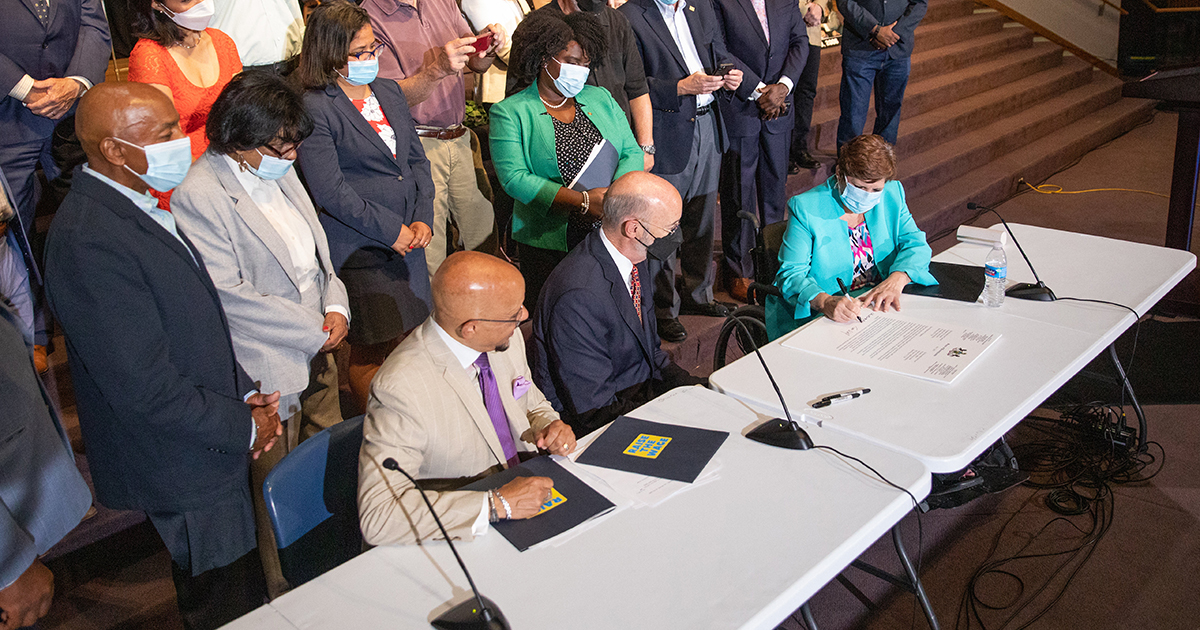 Los participantes en la concentración firmaron una carta dirigida a los líderes de la mayoría del Senado en la que pedían una votación y predecían que se aprobaría si se permitía en el pleno.
Los participantes en la concentración firmaron una carta dirigida a los líderes de la mayoría del Senado en la que pedían una votación y predecían que se aprobaría si se permitía en el pleno.
"El salario mínimo no es ni de lejos un salario digno", declaró la senadora Amanda Cappelletti, que representa a partes de los condados de Delaware y Montgomery. "En mi distrito no hay viviendas asequibles para los que ganan el mínimo actual. Ya es hora de hacer algo al respecto. Debemos aumentarlo inmediatamente".
La senadora Katie Muth, que representa a partes de los condados de Montgomery, Chester y Bucks, calificó de "vergonzoso" el salario mínimo actual y dijo que su valor sería mucho mayor si se ajustara para compensar la disminución del poder adquisitivo.
"Animo a quienes se oponen a aumentar el salario mínimo de Pensilvania desde la vergonzosa tasa de pobreza de 7,25 dólares la hora a que lo prueben por sí mismos con un salario anual inferior a 15.000 dólares después de impuestos", dijo. "En Pensilvania, a una familia de cuatro miembros le cuesta aproximadamente 59.340 dólares cubrir sus necesidades básicas. Si el salario mínimo hubiera aumentado al ritmo de la productividad desde principios de los años 60, estaría en torno a los 22,50 dólares. La desigualdad de ingresos es evitable y los que tienen el poder mayoritario en Harrisburg han estado manteniendo como rehenes a los trabajadores de Pensilvania con su inacción."
Para ver el evento completo, visite aquí. Enlace FTP disponible previa solicitud.
###
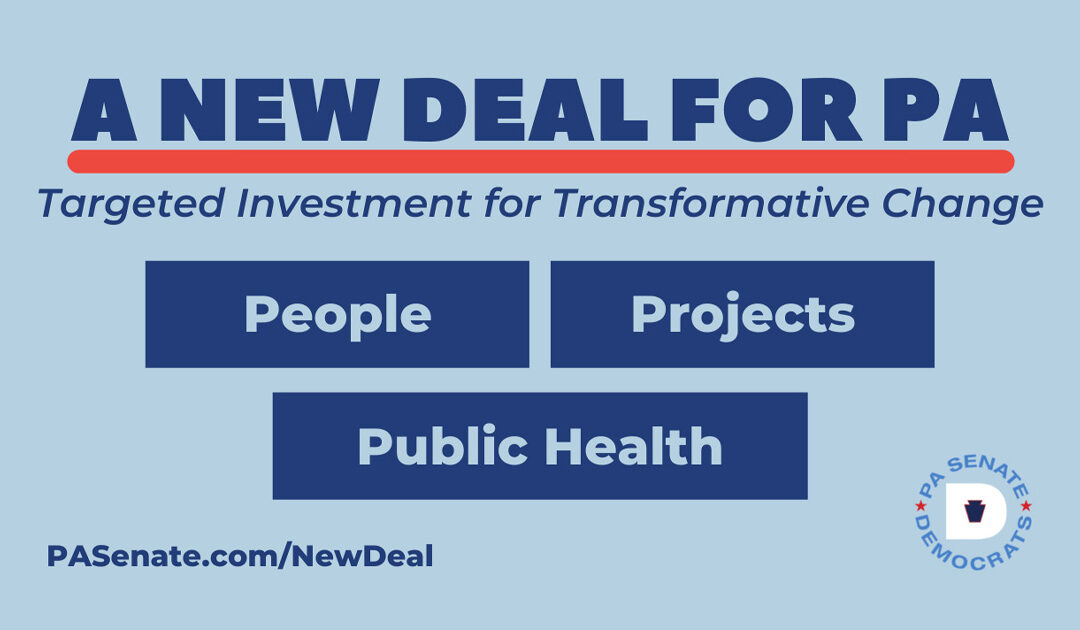
por Christin Brown | 12 de mayo de 2021 | Comunicados de prensa
Harrisburg, Pensilvania - 12 de mayo de 2021 - Hoy , los demócratas del Senado de Pensilvania dieron a conocer el "Nuevo Trato para PA" - una inversión de $ 6.15 mil millones de fondos federales que vienen a la Commonwealth de conformidad con el Plan de Rescate de América.
El New Deal para AP se centra en el empleo, las oportunidades y la equidad, con el siguiente desglose:
Personas - 2.470 millones de dólares
Atención infantil del siglo XXI
Ayuda a las empresas
Educación/Apoyos comunitarios
Formación para el empleo/Desarrollo de la mano de obra
Asistencia para servicios públicos
Proyectos - 2.493 millones de dólares
Desarrollo económico
Infraestructuras
Salud pública - 1.185 millones
Equidad en salud pública/confianza en las vacunas
Recompensar el servicio a los trabajadores de primera línea
"Estos fondos nos brindan una oportunidad única no sólo para tapar los agujeros creados por el año pasado, sino también para encaminarnos hacia una trayectoria que impida que se repita tal devastación, especialmente en lo que se refiere al impacto desproporcionado que sufrieron algunas comunidades", declaró el líder demócrata del Senado, Jay Costa. "Tenemos que ir más allá de los llamamientos a la simple 'reapertura' y centrarnos en la reconstrucción y la recuperación. Nuestras empresas, trabajadores y familias necesitan programas y sistemas de apoyo para llegar a una nueva normalidad."
Al realizar inversiones específicas en las personas, los proyectos y la salud pública, podemos utilizar esta infusión única de fondos federales en PA para realizar mejoras positivas y duraderas que sentarán las bases para crear un cambio transformador en toda la Commonwealth.
"Este plan, que crea empleo y oportunidades y da prioridad a la equidad, es el resultado de un largo y difícil año de escuchar y aprender", dijo Hughes, Presidente de Asignaciones Demócratas del Senado. "Miles de ciudadanos de Pensilvania han dedicado tiempo durante la pandemia a contarnos sus historias, sus retos y sus tragedias. Ahora tenemos una oportunidad histórica para aplicar las lecciones aprendidas no sólo del virus, sino también de las décadas de política pública regresiva que dejó a tantos tan vulnerables a ella. En resumen, este plan pone a la gente de AP en primer lugar".
El New Deal para AP utiliza un enfoque basado en datos para responder a lo aprendido durante la pandemia.
El caucus analizó la situación actual para determinar dónde sigue siendo necesaria la asistencia financiera para ayudar a las personas, las familias y las pequeñas empresas a recuperarse de los devastadores efectos de la pandemia. A continuación, el caucus miró hacia el futuro y evaluó la mejor manera de invertir los fondos del ARP para garantizar que salimos de la pandemia mejor de lo que entramos y crear resiliencia en toda la Commonwealth en preparación para la próxima crisis.
Por último, el grupo ha comparado su propuesta con las orientaciones del Tesoro de EE.UU. publicadas el 10 de mayo de 2021, para asegurarse de que tenemos una base sólida para utilizar los fondos como proponemos.
Orientación federal sobre los usos permitidos de los fondos que vienen a Pennsylvania de la American Rescue Plan ("ARP") Fondo de Alivio Fiscal del Estado se publicó el 10 de mayo de 2021. Pennsylvania recibirá aproximadamente $ 7.3 mil millones en fondos flexibles del Fondo de Alivio Fiscal del Estado. Demócratas del Senado creen que es hora de comenzar la conversación sobre la inversión de estos fondos para que podamos asignar el dinero con el presupuesto del año fiscal 2021-2022
La propuesta de los demócratas del Senado distribuye 6.050 millones de dólares de las siguientes fuentes:
Fondo de Alivio Fiscal del Estado - 4.797.500.000 dólares
Fondo de Proyectos de Capital - $280.000.000
Fondo ESSER - 505.000.000 dólares
Ayuda de Emergencia para Escuelas No Públicas - $150.000.000
Fondo de Respuesta Pandémica - $25.000.000
Otros Fondos - $55.000.000
Fondos locales de contrapartida - $335.000.000
Los condados y municipios recibirán aproximadamente 6.100 millones de dólares del Fondo de Alivio Fiscal Local del Plan de Rescate Americano y los distritos escolares recibirán aproximadamente 4.500 millones de dólares del Fondo ESSER. Si estas unidades de gobierno local se acogen a estos programas, los fondos de contrapartida estatales ascenderán a una media aproximada de 4 $ por cada 1 $ de financiación local.
El plan del Caucus Demócrata del Senado se centra en las inversiones destinadas a lograr una recuperación justa para que Pensilvania pueda reconstruir mejor.
Más información sobre el plan en PASenate.com/NewDeal
###

by Christin Brown | Junio 8, 2020 | News Releases
HARRISBURG - 8 de junio de 2020 - Los miembros del Caucus Demócrata del Senado de Pensilvania anunciaron la dirección de $ 225 millones en fondos federales de la Ley CARES para ayudar a las pequeñas empresas en toda la mancomunidad. Esta financiación fue autorizada por el recientemente promulgado COVID-19 Suplemento de Emergencia a la Ley de Asignación General de 2019 y fue una pieza central del Plan PA CARES del caucus.
La ayuda se distribuirá del siguiente modo: 100 millones de dólares se destinarán al Programa de Revitalización de Empresas de Main Street, 100 millones de dólares al Programa de Revitalización de Empresas Históricamente Desfavorecidas y 25 millones de dólares para el aplazamiento del pago de préstamos y reservas para pérdidas en préstamos afectados por el COVID-19. La ayuda será dirigida por el Departamento de Desarrollo Comunitario y Económico a las Instituciones Financieras de Desarrollo Comunitario (CDFI), que están íntimamente familiarizadas con las necesidades de las pequeñas empresas más vulnerables de nuestras comunidades.
"Quiero dar las gracias al gobernador Wolf por comprometer el liderazgo en la Asamblea General para informar el proceso de traslado de la ayuda federal a los más perjudicados por la pandemia de COVID-19. También quiero dar las gracias al liderazgo de la bancada demócrata del Senado que trabajó con nuestros miembros para formular un plan estratégico para el despliegue de casi $ 4 mil millones en ayuda federal", dijo el senador estatal John Blake (D-Lackawanna). "El programa Main Street Business Revitalization es un reflejo de esa cooperación y liderazgo, y se reunirá con los propietarios de pequeñas empresas de Pensilvania donde están, en la calle principal, después de casi tres meses de pérdida o ausencia de ventas. Permitirá a los propietarios de pequeñas empresas de toda la Commonwealth hacer frente a sus pagos de seguros, alquileres, primas de seguros de salud, impuestos locales y otros gastos que de otro modo no podrían afrontar debido a la pérdida de ventas. Por último, quiero dar las gracias a las 17 CDFI de todo el estado, así como al DCED, por su profesionalidad, agilidad, urgencia y dedicación para hacer llegar lo antes posible esta financiación federal a las pequeñas empresas que más la necesitan."
Las empresas elegibles solicitarán a través de uno de los socios de la Red CDFI y tendrán que haber estado operando en o antes del 15 de febrero de 2020, y debe haber pagado impuestos a los gobiernos estatales y federales. Las pequeñas empresas históricamente desfavorecidas deben tener 25 empleados o menos y haber sufrido pérdidas como consecuencia de la orden de permanencia en el hogar del 19 de marzo del gobernador Tom Wolf. Las organizaciones que soliciten subvenciones del programa de pequeñas empresas históricamente desfavorecidas también deben ser propiedad y estar gestionadas en un 51% por personas social y económicamente desfavorecidas.
"El anuncio de los programas Main Street e Historically Disadvantaged Business Revitalization proporcionará un alivio bienvenido para las empresas familiares en los barrios de toda la Commonwealth", dijo el senador estatal Vincent Hughes (D-Filadelfia/Montgomery). "Desde que comenzó esta pandemia, hemos escuchado las necesidades de los talleres de chapa y pintura, las barberías, las esteticistas, los propietarios de pizzerías, los establecimientos de soul food y otros negocios de nuestras comunidades. Las necesidades de estas empresas que no pudieron obtener la ayuda que tanto necesitaban de otros programas estatales y federales fueron una prioridad en el anuncio del Programa PA CARES de nuestro Caucus Demócrata del Senado el 29 de abril. Durante meses, mi oficina ha trabajado con una red de organizaciones comunitarias de confianza que tienen un historial probado de trabajo con nuestras pequeñas CDFI para encontrar una solución para ayudar a nuestras empresas de barrio. Creo que estos programas son esa solución. Todavía hay más trabajo por hacer, pero estos programas son una victoria para Pensilvania y sus pequeñas empresas."
Las empresas podrán optar a subvenciones de hasta 50.000 dólares. Las subvenciones pueden utilizarse para cubrir gastos de funcionamiento durante el cierre y en el periodo de transición hasta la reapertura, asistencia técnica y formación, alivio del pago de deudas para prestatarios de CDFI y reservas para préstamos incobrables.
"Nuestras pequeñas empresas en todo el estado hicieron sacrificios para que pudiéramos aplanar la curva de COVID-19 y salvar vidas", dijo el líder demócrata del Senado Jay Costa, Jr. "Ahora que empezamos a recuperarnos, nuestras empresas necesitarán y merecen ayuda para volver a abrir sus puertas, volver a contratar a su personal y servir a nuestras comunidades de nuevo. Les damos las gracias por su paciencia a través de este tiempo difícil, y estamos dispuestos a ofrecer los programas, préstamos y asistencia que necesitan."
Las empresas deberán presentar propuestas para su revisión en las que se documenten las pérdidas de ventas, los ingresos previstos, la duración del cierre como consecuencia del COVID-19 y los recibos de socorro de otras ayudas públicas federales, estatales y locales. Las empresas elegibles presentarán su solicitud directamente a través de una CDFI local.
"Uno de los objetivos del plan de estímulo para la recuperación tras la pandemia que presenté en marzo era poner en marcha las operaciones empresariales y acelerar la recuperación económica facilitando recursos para que más hombres y mujeres vuelvan a trabajar más rápidamente", declaró Brewster. Utilizar el dinero federal de CARE para reforzar las empresas y facilitar la transición a la vida laboral es de vital importancia". La iniciativa caucus CARES incluye una pieza del plan y será especialmente útil para las pequeñas empresas mientras cubren gastos y gestionan los costes de puesta en marcha. Además, supondrá una ayuda para las pequeñas empresas que no hayan podido acceder a otros programas de asistencia empresarial estatales o federales."
Los fondos distribuidos serán supervisados por el DCED para hacer un seguimiento del número total de subvenciones concedidas en el marco de estos programas, incluido el condado, el número de puestos de trabajo salvados gracias a las subvenciones, el importe total del pago y aplazamiento de préstamos, los costes administrativos, etc.
"Gracias al gobernador Wolf y su administración por reconocer la necesidad de nuestro Programa de Revitalización de Negocios Main Street e incorporar esa propuesta en el plan de la Commonwealth para apoyar a nuestras pequeñas empresas, que representan casi la mitad de la fuerza de trabajo del sector privado en Pensilvania - 2,5 millones de puestos de trabajo", dijo el senador Iovino (D-Allegheny/Washington). "Las pequeñas empresas son los creadores de empleo en nuestras comunidades, los generadores de ingresos para nuestra Commonwealth, y la piedra angular de las calles principales vibrantes. Como los propietarios de pequeñas empresas están luchando para aguantar, este paquete de subvenciones de 225 millones de dólares es exactamente el tipo de salvavidas que estos motores económicos necesitan para apoyar nuestra recuperación."
Para más información sobre el plan de recuperación COVID-19, integral y centrado en las personas, visite pasenate.com/pacares.
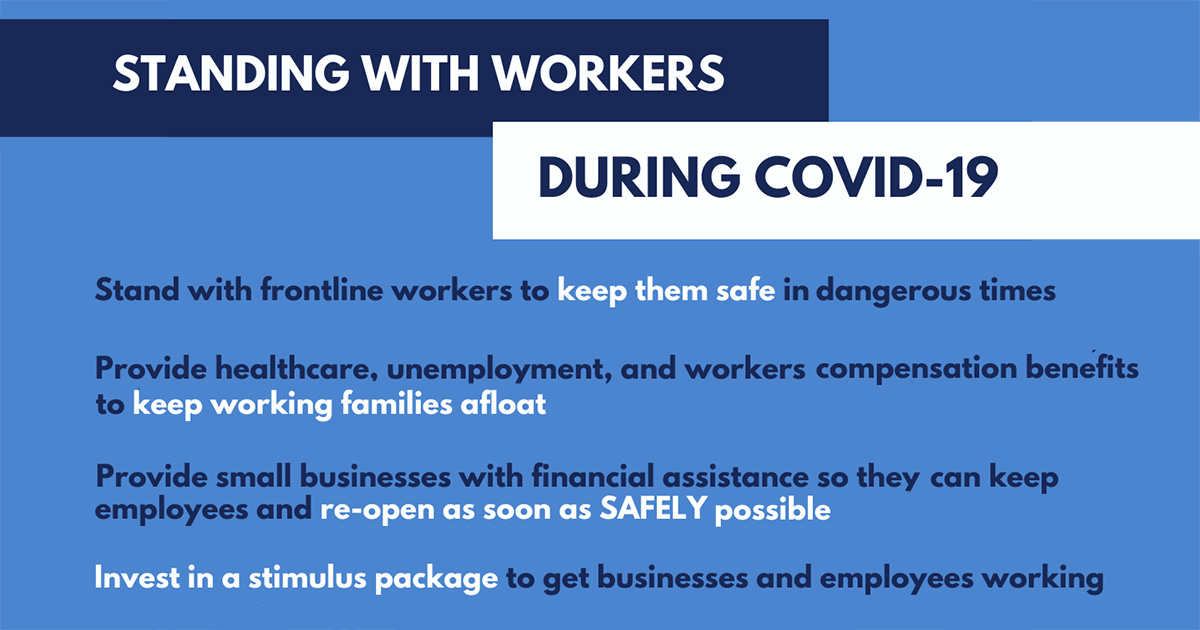
by Christin Brown | Abril 8, 2020 | News Releases
Harrisburg, PA − Abril 8, 2020 − The Senate adjourned Martes afternoon after the House Republicans indicated they would not be taking up Senate Bill 841, legislation that would have enabled local municipalities to hold their meetings remotely, permitted e-notary use; lengthened the time period a property tax payer can receive an early payment discount and delay penalties for late payments to Dec. 31st; and allowed businesses to make delayed payments on EITC. Another important amendment offered by Senator Pam Iovino (D-Allegheny) allowed school districts to renegotiate contracts to ensure contracted school workers can get paid and continue to receive benefits.
The amended SB 841 passed the Senate with bipartisan support. While the Senate Democrats and Republicans chose to put partisan difference aside, the House Republicans were pushing to please special interests and big donors. Intending to use this crisis as leverage, Speaker Turzai and his caucus passed legislation to prematurely allow businesses to reopen during this public health crisis and create a partisan task force to interfere with the Governor’s disaster response, both of which unnecessarily risk lives and threaten to expend the emergency.
“While the Governor and Department of Health Secretary offer leadership on public safety in daily briefings and Democratic members of the PA House and Senate draft legislation to protect working people who are either out of work or employed on the front lines of essential businesses, Republicans are putting lives at risk and undermining the Governor and Secretary Levine’s best efforts to end this crisis,” said Senate Democratic Leader Jay Costa, Jr. “Instead of taking the advice of our Health Secretary, they are trying to slow down our response and hasten the re-opening of non-essential businesses against the guidance of every public health entity in the country.”
The House Republicans were seeking even more egregious measures to provide civil immunity to big businesses, upend school districts ability to pay their teachers, and leave our corrections department employees at serious threat of the Coronavirus. Perhaps worst of all, the language does nothing to protect frontline workers, provide assistance to those that are out of work, or to help small businesses weather this crisis.
In an amendment to Senate Bill 327, House Republicans designed a task force with partisan appointees to usurp the Governor’s ability to rapidly respond to this quickly-evolving crisis. Their bill would require the Secretary of Health to leave PEMA, take hours away from public health crisis planning and defend her work in front of a redundant, political body.
The Senate Democratic Caucus will not support these bills. Alternatively, this caucus will be supporting legislation on the following issues:
- The American Working Family Relief Action Plan for front-line worker protections (Collett/L. Williams)
- Protecting workers during public health emergencies (Santarsiero)
- COVID-19 Food Worker Safety Act (Tartaglione)
- COVID-19 Grocery Store Worker Safety Act (Tartaglione)
- Payment of contract services in schools (Iovino)
- Childcare assistance (Schwank/L. Williams)
- Emergency expansion of the Family Medical Leave Act to provide paid sick leave (Farnese)
- Crisis grants for volunteer fire and EMS companies due to COVID-19 (Brewster)
- Require business interruption insurance to cover COVID-19 related business closures (Hughes)
- Eviction protection for all disaster emergencies (Farnese)
- Coronavirus disease and schools: allowing for online instruction (Dinniman)
- Creating a Common Wealth Fund to collect donations from individuals to provide for essential needs of those in need (AH Williams)
- Providing a presumption of eligibility for Workers’ Compensation benefits for workers that get sick in the workplace (Tartaglione)
- Ensuring receipt of a stimulus check from the Federal government is not included in an individual’s income for purposes of qualifying for social safety nets (Schwank)
- Exempting stimulus checks from the Federal government from State and local taxation (Brewster)
- Collaborating with financial institutions to mandate mortgage loan forgiveness, assistance to homeowners that were laid off due to state emergencies (Farnese)
“While many working Pennsylvanians are suffering from the COVID-19 pandemic, facing lost hours or even complete unemployment, others who find themselves in more fortunate circumstances have expressed a desire to help their fellow citizens by either donating to a local charity or patronizing local businesses,” said Senator Anthony H. Williams. “By establishing the “Pennsylvania Common Wealth” restricted account, taxpayers could redirect all or a portion of their stimulus check to the state, which in turn would be authorized to direct those funds into programs which help the neediest Pennsylvanians – property tax & rent rebates, temporary assistance for needy families, CHIP or medical assistance.”
“Pennsylvania needs solutions that help protect its working people who have been hit the hardest by the fallout of the coronavirus pandemic,” Senator Vincent Hughes said. “We in the Pennsylvania Senate Democratic Caucus have put forth a number of policy proposals that would do just that, meanwhile House Republicans have chosen to ignore these needs and push an agenda that jeopardizes public health and puts additional pressure on working people by delaying immediate relief. Our mission should be helping people in this unprecedented time of need and we will remain vigilant in protecting hardworking folks across the commonwealth.”
“As public servants, our most important duty is to protect the health, safety and welfare of our citizens. This includes making difficult decisions in challenging times. We all want businesses to reopen, employees back on the job, students back in classrooms and some semblance of normal life to resume, but that cannot happen unless we first continue mitigation efforts and follow the advice of our scientists and experts,” said Senator Wayne D. Fontana. “Anything contrary can set back progress and cause further harm on our economy and most importantly, on human health. The bipartisan legislation the Senate approved provides some necessary guidance and relief to local governments, businesses, school employees and property taxpayers during this unprecedented situation. It is unconscionable that House Republicans blatantly disregarded that duty and have chosen not to act.”
“The spread of coronavirus has not quieted the voice of special interests in Harrisburg and that’s tragic,” said Senator Larry Farnese. “Mitigation through isolation is working and we have to recognize that sacrifice through legislation that actually helps front-line workers instead of just saying nice things on social media.”
“This crisis and the Commonwealth’s response to the COVID-19 pandemic requires leadership, transparency and cooperation – not partisan politics,” said Senator John Blake. “While we’ve worked well with the Senate majority on real solutions that actually help people in this crisis, the House majority looks to undermine the executive authority of the Governor as well as the advice of medical and scientific experts regarding public health. I applaud the work being done by Governor Wolf and his administration to keep Pennsylvanians safe and to mitigate the spread of COVID-19. I will continue to support important legislation to help our business community, front-line workers and medical professionals; and to protect our citizens, schools and local governments across this state. We need to remain vigilant in following the recommendations of the PA Department of Health and the federal CDC.”
“Issues that the Commonwealth was already facing have been exacerbated by this pandemic, and child care services and early learning programs are near the top of the list. Childcare centers are teetering on the brink of insolvency, which is why part of our legislative package addresses early childhood learning and safe, quality childcare. We will not be able to restart Pennsylvania’s economy without this key component,” Senator Judy Schwank said. “Additionally, it’s vital that the income requirements of state programs like PACENET and Property Tax and Rent Rebate are adjusted so that Pennsylvanians receiving federal aid are not penalized later.”
“The key to an effective response to the pandemic is to ensure that our citizens are protected, health risks are addressed, and our economy restarts quickly,” Senator Jim Brewster said. “That’s why I introduced a six-point stimulus plan that will help small business, protect workers and create jobs once we are clear the threat posed by the pandemic. In addition, we need to make sure to address the immediate and long-term needs of first responders and all workers and businesses who are providing essential services during this time of extraordinary stress.”
“There is no segment of our Commonwealth that hasn’t been upended by this crisis. Everything is a priority. But in order to save livelihoods, we must first save lives,” said Senator Maria Collett. “As a nurse, I know firsthand the challenges our health care workers are up against and the urgency of passing legislation like the American Working Family Relief Action Plan for Front-Line Workers. Our doctors, nurses, first responders, senior care aides and others should not have to worry about getting sick or infecting others while performing their essential work.”
“It is irresponsible for the state to reopen businesses at the height of the COVID-19 outbreak. Those who are not essential workers should remain home,” said Senator Art Haywood. “We need to do all we can as legislators to support essential employees risking their lives on a daily basis,” said Senator Haywood (D-Montgomery/Philadelphia). “I will continue to support the work Governor Wolf and Secretary Levine have done to inform the public to remain safe and stay home.”
“The citizens of Pennsylvania are counting on their elected representatives to save lives by responding swiftly, pragmatically, and in a bipartisan manner to slow the spread of this highly contagious virus,” said Senator Pam Iovino. “To fulfill our duty to the public, we must follow the consensus guidance of public health professionals, focus on protecting front-line essential workers, and put in place protections that allow furloughed or unemployed workers and small businesses to weather the economic disruption.”
“As the Democratic chair of the Local Government Committee, I worked with stakeholders for weeks to craft the provisions of SB 841, I am disappointed these commonsense measures, which passed the Senate with bipartisan support, are being held up by House Republicans for little reason,” said Senator Tim Kearney. “The House should immediately pass SB 841 and focus on bringing relief to Pennsylvanians, rather than sabotaging the Governor’s efforts to keep our families safe.”
“Yesterday, the majority party in both chambers failed to use their legislative power, where they can literally pass any bill they want to, and instead decided to pack up and go home without,” said Senator Katie Muth. “Failing to pass meaningful bills when people are fighting for their lives is simply negligent.”
“Now is not the time to play politics,” said Senator Steve Santarsiero. “Saving lives has to be the first priority. In order to do that, we must all do our part and follow the Governor’s and Department of Health’s plans as they’ve been explained to us countless times. SB 841 is just one of many ways our caucus has worked in a bipartisan effort to provide relief to those who need it most. However, SB 327 is exactly what our healthcare professionals warn us against. Promoting a premature return to normalcy will only undermine our effort to keep the public safe, and further endanger thousands of lives.”
“Government’s most important role is the protection of its people. Since the COVID-19 crisis the Senate has met three times, with little to show for it. Communities across the commonwealth have no interest in the paralysis of government especially in the most desperate of times. What they do care about is the protection of our essential workforce, the interruption of our small businesses, job loss, staying in their homes and educating their children. The only thing that matters is the preservation and protection of every resource needed to keep families safe during this health crisis,” said Senator Sharif Street.
“We need to be back in Harrisburg, we need to get back to work. We must work together to ensure our communities are protected during uncertain times.”
“As thousands of Pennsylvanians continue to get sick and hundreds die, now is no time to play partisan politics,” Senator Tina Tartaglione said. “As public leaders, we must unite behind the common goal of reducing the threat of this virus and mitigating the harm being done to our constituents. The package of bills we have proposed will directly help all Pennsylvania families, including essential workers, displaced workers, first responders, school children, those who have become sick, and those in need. I urge all legislators from all political parties to support these bills.”
“Stopping the spread of COVID-19 and saving lives is our top priority. We also need to protect and support our constituents, our communities, and our businesses,” said Senator Lindsey Williams. “Our front-line essential workers – our hospital workers, grocery store workers, emergency service personnel and others – cannot afford to wait for PPE. They needed it weeks ago. Our childcare facilities need our help to stay open and provide care to the children of our essential workers while they risk their lives for us. Our small businesses need financial support to stay afloat. Our municipalities need the ability to meet remotely and make decisions that will ensure the safety of all of residents. There are a lot of needs right now and our constituents do not have time for us to waste playing partisan games or naming bridges. The Senate Democrats have offered concrete solutions that will help people. We should all be working together to get them to the Governor’s desk for signature as soon as possible.”
More information on the work of the Pennsylvania Senate Democratic Caucus during the COVID-19 crisis can be found at pasenate.com/covid19.
###
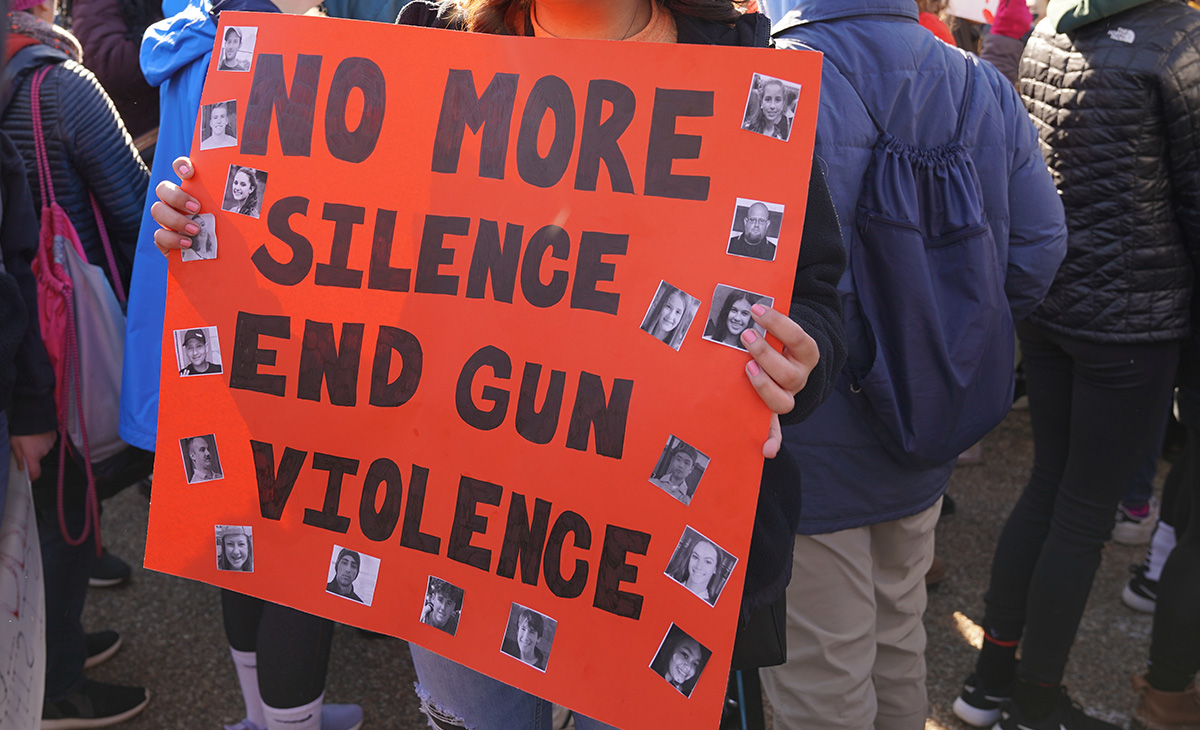
by Christin Brown | Junio 24, 2019 | News Releases
Harrisburg, Pa. − Junio 24, 2019 − Members of the Pennsylvania Senate Democratic Caucus today jointly sent a letter to Governor Tom Wolf requesting a disaster declaration for gun violence in the Commonwealth.
“We believe it is necessary to raise the public’s awareness of the massive loss of human life and the suffering inflicted on affected family, friends and neighbors where this tragedy is unfolding daily,” they wrote. “Just as you have signed six disaster declarations to provide every tool at the Commonwealth’s disposal to combat the opioid epidemic, the death toll and impact from illegal guns should merit immediate and coordinated attention.”
Specifically, a disaster declaration could do the following:
- Establish a task force led by the Department of Health to create and implement a public health framework for addressing gun violence
- Establish a command center in the Pennsylvania Emergency Management Agency to coordinate state and local law enforcement response
- Enhance the Joint-Local State Firearm Taskforce through additional personnel and funding to take illegal guns off the street
- Expand information gathering and sharing between all levels of law enforcement and community groups
- Increase law enforcement presence, both local and state, in targeted areas where gun violence is most prevalent
- Expedite and expand grants and other funding sources for community groups and nonprofit associations with a proven record of violence reduction and prevention
- Provide additional state resources for behavioral and mental health
- Bringing to bear the significant wealth of knowledge and experience in the Departments of Health and Human Services to provide de-escalation and de-confliction training throughout the community
- Require the Pennsylvania Department of Education provide training and professional development on trauma-informed education
View full letter →
###

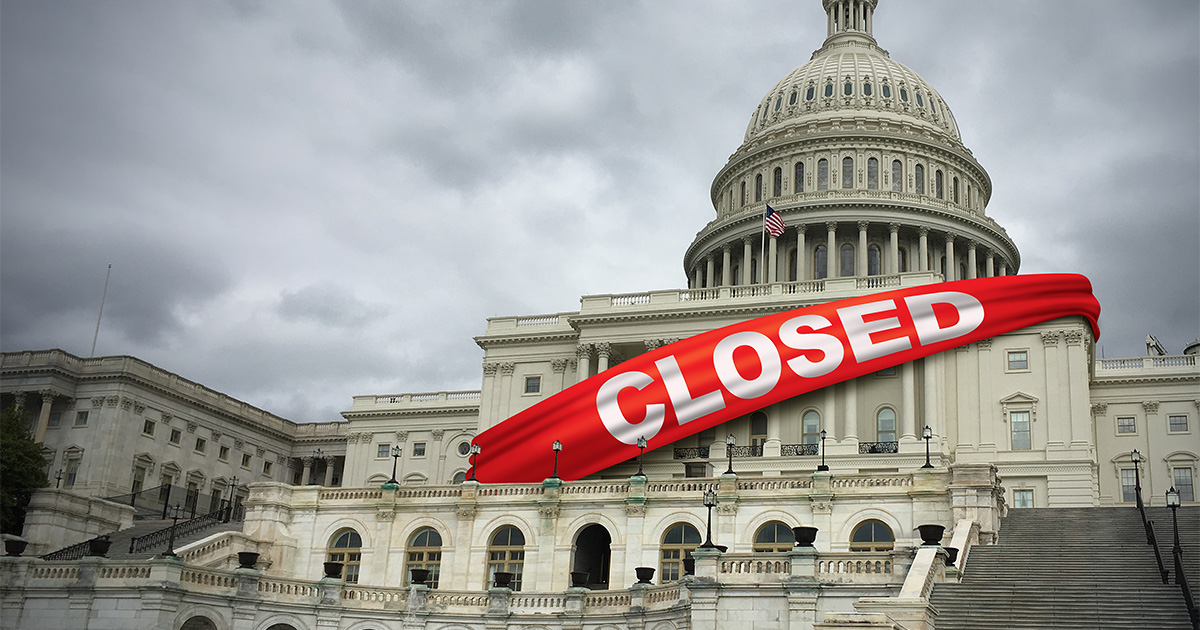
by Christin Brown | Enero 10, 2019 | News Releases
Harrisburg, PA – Enero 10, 2019 – On behalf of the 12,000 Pennsylvania federal employees, contractors and subcontractors who are not receiving a paycheck during the partial federal government shutdown, Senator Vincent Hughes (D-Philadelphia/Montgomery), Senator Christine Tartaglione (D-Philadelphia), Senator Sharif Street (D-Philadelphia) and Senator Jay Costa (D-Allegheny) are taken steps to help those in need.
After hearing reports from constituents facing financial hardships during the shutdown, the senators wrote the 10 largest banks, relative to number of branches, in Pennsylvania. Their hopes are to share information about banks’ existing assistance programs or to spur action on behalf of working people with banks that have not addressed the issue.
“Ten years ago, we bailed out failing banks during a recession and now it is time to help working people during their financial crisis,” Sen. Hughes said. “These hard-working folks are suffering through no fault of their own. The least we can do is get them help until are get paid again.”
Motivations for the letter came from the senators understanding that 78 percent of U.S. workers live paycheck to paycheck and there are no furloughs for essential expenses. Mortgages, rent, groceries, car payments and other bills must be paid whether the government is functioning.
“We cannot stand by and do nothing while these federal employees are left without paychecks,” said Sen. Costa. “These are folks ready and willing to work in service of the federal government, but now face eviction and piling bills. I hope that financial institutions are willing to step up to help them, and I’ll do everything in my power to ensure these federal employees are not punished for this shutdown.”
In total, there are 62,000 federal workers in Pennsylvania and about 12,000 who are furloughed or working without pay. Nationally 800,000 federal employees have had their jobs disrupted, with 380,000 furloughed or sent home without pay. These figures speak to an economic crisis that must be addressed, the senators said.
“As the stalemate in Washington is about to enter its fourth week, thousands of hard-working Pennsylvanians are suffering a very heavy burden,” Sen. Tartaglione said. “I can’t think of any greater commitment to purpose and level of professionalism than we are seeing from those who want to work, but can’t, and from those who continue to work, but aren’t receiving their just compensation. It is imperative that we do all we can as a community to support them in their time of need.”
Rallies and protests across Pennsylvania also drew the attention of the senators who have made the fight for working people a central issue. Pennsylvania’s furloughed federal workers not receiving paychecks include TSA officers, federal prison workers, national park workers and employees of the Environmental Protection agency.
“The financial strain placed on federal government employees, contractors and subcontractors in the commonwealth continues to grow,” Sen. Street said. “This is a heavy burden on individuals and families who they cannot endure such hardships for an extended period of time. Banks have an opportunity to mitigate these hardships and must help the people. As the Democratic chairman of the Banking and Insurance Committee, I encourage the banks to act with urgency in this regard.”
The full letter to the banks can be found here.
###
by Christin Brown | Noviembre 18, 2016 | News Releases
Harrisburg – Noviembre 18th, 2016 – Senators Vincent Hughes and Christine Tartaglione issued the following statements on the failure of the Pennsylvania Senate to extend funding for Labor & Industry service call centers:
Senator Hughes: “I am outraged by the failure of the Pennsylvania Senate Republican leadership to hold a vote to extend funding for unemployment compensation service call centers. Because of this inaction, nearly 600 working people will lose their jobs just one week before Christmas. It also means that thousands of unemployed Pennsylvanians will experience longer wait times when seeking assistance while applying for benefits.
“We must be clear that was a choice made by Senate Republicans for political reasons. They control the Senate calendar and Governor Wolf and Senate Democrats made it clear throughout the fall session that this bill was a priority. The bill should have been voted on Octubre 26 but it was delayed when the Republican pension plan fell apart. Then, on our final session day Miércoles, the bill was marked for a vote but was pulled again after their plan to further limit a women’s right to make her own health decisions failed. Because they twice didn’t get what they wanted, Senator Scott Wagner decided to play Scrooge to 600 workers who will lose their jobs just one week before Christmas.
“The inconsistency in public statements by Senate Republicans is clear proof that this failure to act is pure politics. First, the Senate Republicans tried to blame Governor Wolf even though they control what bills we consider in the Senate. Then, Senator Wagner openly admits that he wanted to cut funding to these call centers and see them shut down. They can’t have it both ways.
“Republicans also cannot simultaneously claim to be the champions of the working class and force the closure of facilities that help people who are unemployed. I call on the Senate Republicans to immediately reconvene the Senate to pass an extension of funding to unemployment compensation service calls centers.”
State Senator Christine Tartaglione, Democratic Chairwoman of Senate Labor & Industry Committee, offered the following statement:
“I join my colleague in calling for Senate Republicans to move on this important issue. I have been calling for the funding to be restored to these calls centers as one of my top priorities for the entire legislative session and offered my own bill, Senate Bill 1335 that would have reauthorized this funding for an additional four years. It is important to realize that this money is available, it simply needs to authorized. There is no reason that the Senate should not have acted to prevent these layoffs. Now, nearly 600 workers will lose their jobs and thousands of unemployed Pennsylvanians will see diminished services.”
State Senator Vincent Hughes represents the 7th Senatorial District and is the Democratic Chairman of the Senate Appropriations Committee. Senator Christine Tartaglione represents the 2nd Senatorial District and is the Democratic Chair of the Senate Labor & Industry Committee.
###
by Christin Brown | Junio 22, 2016 | News Releases
Junio 22, 2016 – State Senate Democratic Whip Anthony H. Williams (D-Philadelphia/Delaware) today said that the Pennsylvania Human Relations Commission (PHRC) has been devastated by recurring state budget cuts and that the state spending plan now under consideration needs to address agency funding shortfalls.
“The PHRC has an incredibly important job to do and it cannot function properly if its funding is slashed year in and year out,” Williams said today.
Williams was joined at a news conference at the Capitol by his Democratic colleague from Philadelphia Sen. Christine Tartaglione (D-Philadelphia), Senate Democratic leader Sen. Jay Costa (D-Allegheny), Democratic Appropriations Chair Sen. Vincent J. Hughes (D-Philadelphia/Montgomery) other Democratic senators and advocates.
“The agency’s ability to ensure that civil rights protections are upheld has been compromised by chronic underfunding,” Tartaglione said. “We are here to request that additional funds be included in the appropriation for the commission so it has the resources to do its important work.”
The state appropriation for the PHRC has fallen from $10.6 million in 2008 to $8.7 million last year. The total agency budget was reduced from $14.1 million to $10 million over the same time span.
“Incredibly, at a time when we should be doing more to protect civil rights, the agency dedicated to this purpose has had to dramatically cut staff and is under pressure to close cases without proper investigation,” Williams said.
The lawmakers are seeking an additional $2 million in state funding in this budget to bolster operations at the PHRC.
“I am pleased that my Senate Democratic colleagues and those representatives that have been touched by the work of the PHRC have come out today to support the call for more funding,” Williams said. “It is important that those of us who are committed to preserving this agency as a protector of civil rights stay united and put pressure on budget negotiators.”
Williams said that staffing at the commission is at a crisis point. According to the senator, the historical complement of investigators and professional staff has been just under 200 employees. Today, there are only 76 investigators and professionals to handle the agency’s responsibilities.
“Values like equality, service, integrity, excellence and teamwork were once associated with the commission and its operations,” Williams said. “The PHRC was once recognized as a preeminent protector of civil rights.
“We can get the agency back to that position of being a nationally-recognized leader, but it has to be funded properly.”
The call for more funding and for making systemic repairs at the commission follows media reports about upheaval at the agency over the last several years. Allegations of long-time staff being forced out, hostile working conditions and discriminatory hiring practices have been cited in news reports.
The operations of the commission were recently examined at a Senate State Government Committee hearing requested by Williams earlier this month.
-30-
by Christin Brown | Octubre 28, 2015 | News Releases
Harrisburg – Octubre 28, 2015 – At the request of state Sen. Vince Hughes (D-Phila.), the Senate Democratic Policy Committee today held a hearing on the devastating impact that the state’s 120-day budget impasse is having on schools across the state.
“While many of the budget dispute points remain unresolved, what is clear is that the consequences of this impasse are far-reaching,” said Sen. Lisa Boscola (D-Northampton), who chairs the committee. “This hearing gives lawmakers a sense of how schools are handling the funding shortfall, and what problems they’ll face if this stalemate continues to drag on.”
Hughes added, “A growing number of schools have been cornered into borrowing money and taking out credit lines just to keep their doors open. Hopefully, this hearing’s focus on this worsening statewide financial crisis will encourage greater urgency, cooperation and compromise in the ongoing budget negotiations.”
During the hearing, state Auditor General Eugene DePasquale testified that at least 27 school districts have taken out loans totaling more than $431 million. He projected that interest payments will total $30 million if the stalemate reaches mid-Noviembre.
Those who testified decried how the impasse has harmed students, depleted reserves and how taxpayers will be needlessly saddled with paying the interest on the growing number of loans and credit lines that schools are obtaining to keep their doors open.
Erie Public Schools Superintendent Jay Badams lamented that his district will need to borrow $30 million just to get through Enero.
“That’s $114,000 in wasted interest money that could have been used for so many badly needed educational expenses,” Badams said.
Dr. Joseph Roy, who serves as superintendent of the Bethlehem Area School District in Northampton County, added that “choices at the state level continue to hammer school districts.” He said the diversion of funds to charter and cyber schools and a “punitive” approach to public education has blown up school expenditures.
Dr. Rula Skezas, who serves as superintendent of the McKeesport Area School District in Allegheny County, noted that even if the district receives its proposed funding it would still fall short of what it received during the 2011 school year. She said McKeesport has taken out a $5 million line of credit to make it to Diciembre. She said the district has already eliminated 110 staff positions to try and make ends meet.
Hughes, who serves as Democratic chair of the Appropriations Committee, said public, charter and private schools are already reeling from years of being underfunded. He noted that the Philadelphia School District has already borrowed $275 million during the impasse. Fran Burns, who serves as chief operating officer for the School District of Philadelphia, testified that the district has struggled to contend with a “structural deficit.”
Lamenting the impact on local working families who fund schools through property taxes, Boscola pointed toward an educational survey conducted earlier this year showing that nearly 75 percent of districts were planning to impose property tax hikes, 30 percent were planning on making additional program cuts, and 41 percent were making more staff cuts. She said the state has withheld approximately $3 billion in school funds since the budget impasse began in Julio.
Joining Boscola and Hughes at the Capitol committee hearing were Senators John Blake (D-Lackawanna), Jim Brewster (D-Allegheny), Andrew Dinniman (D-Montgomery), Christine Tartaglione (D-Phila.) and Sean Wiley (D-Erie),
Those testifying included:
- The Honorable Eugene DePasquale
Pennsylvania Auditor General
- Fran Burns
Chief Operating Officer, School District of Philadelphia
- Joseph Gorham
Superintendent of Schools, Carbondale Area School District
- Dr. Joseph Roy
Superintendent of Schools, Bethlehem Area School District
- Dr. Jay D. Badams
Superintendent, Erie Public Schools
- Dr. Rula S. Skezas
Superintendent, McKeesport Area School District
- Marjorie Neff
Chair, School Reform Commission
- Anthony Pirrello
CEO, Montessori Regional Charter School of Erie, and Vice President of Pennsylvania Coalition of Public Charter Schools
- Matt Przywara
Member, PASBO
Chief Financial and Operations Officer, School District of Lancaster
- Bill LaCoff
President, Pennsylvania School Boards Association
- Susan Gobreski
Education Voters of Pennsylvania
- Dr. Pearl English
School Nurse, School District of Philadelphia
# # #
by Christin Brown | Noviembre 30, 2011 | News Releases
School is a Successful Model of Education Reform
PHILADELPHIA, Noviembre 30, 2011 -State Sens. Vincent J. Hughes (D-Philadelphia/Montgomery) and Christine Tartaglione toured Stetson Middle School today to get a first-hand look at the school’s remarkable turnaround.
“It is an honor to be here today to meet with the faculty, students, and parents of this promising school. Stetson Middle School is a successful model of education reform,” Hughes said. “After years of underachievement, Stetson is now a school with a promising academic future for all students.”
Stetson Middle School, which has a largely Hispanic student body, was one of Philadelphia’s lowest performing schools, until it was taken over by Aspira of Pennsylvania, a Hispanic advocacy group. Since the takeover, the school has produced academic gains, while reducing violence and disruptive behavior.
“In a changing world economy, education becomes more valuable every day,” Tartaglione said. “The success at Stetson proves that with parents, teachers, and administrators working together to help students the future can be bright for any student who wants to achieve.”
Hughes was instrumental, along with Success Schools COO Robert Lysek, in securing 50 iPads for Stetson students and 10 for teachers and administrators. The students use the iPads for remedial math and writing support. Teachers use them to support and facilitate the lessons.
During the tour, Hughes and Tartaglione were updated by student leaders on how Stetson was turned around through targeted education reforms. Many once-disruptive students are now classroom leaders, excelling both academically and socially. The school has seen gains in PSSA scores as well.
The Parent and President School Advisory Council also spoke with the senators about what a great learning environment the school has become.
# # #




 El 9 de juliothEn 2006, el gobernador Ed Rendell se unió a la senadora Christine Tartaglione, al senador Vincent Hughes y al senador Jay Costa para firmar la Ley del Senado 1090, la legislación de la senadora Tartaglione que elevaba el salario mínimo de Pensilvania a 7,15 dólares.
El 9 de juliothEn 2006, el gobernador Ed Rendell se unió a la senadora Christine Tartaglione, al senador Vincent Hughes y al senador Jay Costa para firmar la Ley del Senado 1090, la legislación de la senadora Tartaglione que elevaba el salario mínimo de Pensilvania a 7,15 dólares.



 Los participantes en la concentración firmaron una carta dirigida a los líderes de la mayoría del Senado en la que pedían una votación y predecían que se aprobaría si se permitía en el pleno.
Los participantes en la concentración firmaron una carta dirigida a los líderes de la mayoría del Senado en la que pedían una votación y predecían que se aprobaría si se permitía en el pleno.




